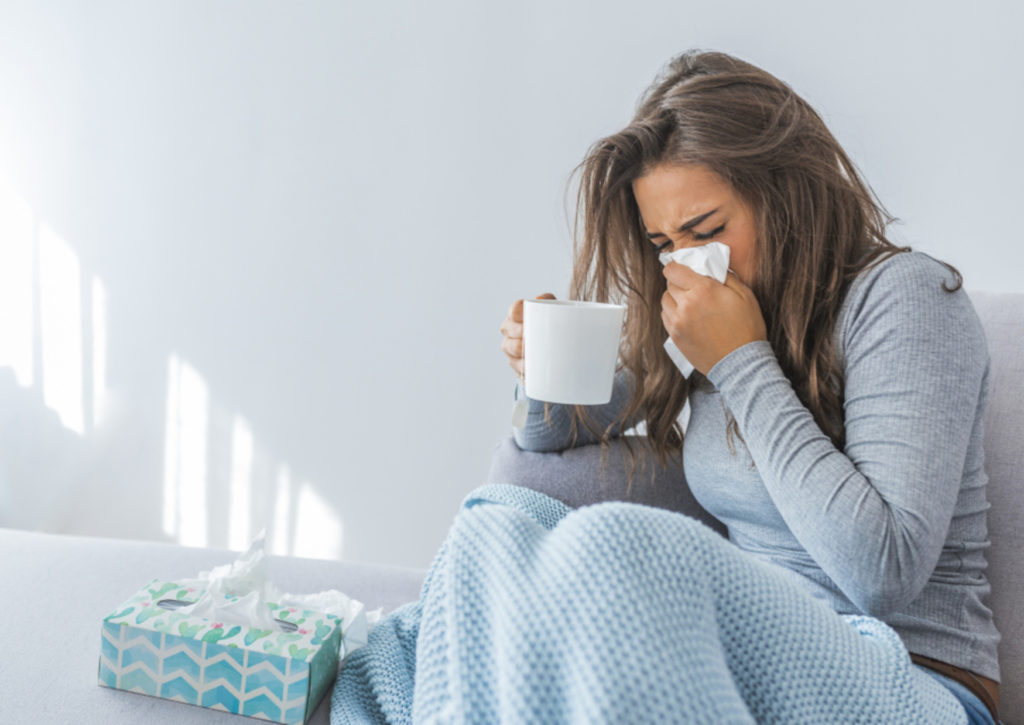
My friend Julie is always full of energy and life, so when she told me on the phone that she was having trouble getting out of bed, I knew something was wrong. I visited her; she had a fever and a horrible cough. I was anxious about her, so I brought her soup, orange juice, and medicine. And then, we went to her doctor’s office.
The old saying, “It takes three days to develop a cold, three days to get it, and three days to go away,” is pretty accurate. So if your cold has lasted more than ten days, it’s time to get help from a doctor, as it may not be cold.
Colds are contagious viral respiratory infections that cause inflammation in the linings of the nose and throat. Because a virus causes them, antibiotics will not help. Common cold symptoms are familiar to everyone: nasal congestion, sneezing, coughing, runny nose, watery eyes, headache, minor muscle aches, tiredness, and sore throat.
Colds are easily spread through the air by the sneezing or coughing of someone already sick. It is not the winter weather that causes colds, but a decrease in your body’s immunity due to stress, overwork, etc.
Cold prevention. Maintaining a robust immune system by controlling stress and living a healthy lifestyle is the medium to long-term answer. Moreover, limit your exposure to the cold virus by washing your hands often, keeping people with colds away, avoiding sharing towels and phones, and try not to touch your face with unwashed hands.
Natural cold treatments. Vitamin C, the most popular choice, does not prevent colds but increases your immune system response and helps shorten their duration. Vitamin A taken in high doses (50,000 IU twice a day) at the first signs of cold also helps.
Zinc lozenges speed recovery and soothes a sore throat. To help a sore throat, try gargling with warm, salty water several times a day and drinking warm liquids, such as tea. A cold is like a mild flu, but a more severe flu affects the entire body, with high fever, chills, headaches, joint and muscle pain, cough, dry or burning eyes, sore throat, and fatigue.
People at higher risk of developing complications with the flu are the elderly, those with chronic illnesses (such as heart or lung disease), and anyone whose immune system is depressed, such as AIDS or chemotherapy patients.
What causes the flu? Flu outbreaks are caused by changing strains of three primary flu viruses. Type A viruses are the most potent and responsible for epidemics. Type B viruses are less severe, and type C viruses are the mildest, more like a common cold.
Stay in bed, rest or sleep until your temperature usually returns. Drink room temperature water and choose fruit/vegetable juices, vegetables, chicken, or clear meat soups. If you have a dry cough, use a humidifier in the room and add eucalyptus oil.
Some of the natural cures used for centuries to prevent colds and flu are promising results in research studies.
1 Elderberry (Sambucus). One of the natural cures that have attracted much attention is elderberry extract, which prevents the virus from attacking cells. One study found a 50% reduction in the severity and duration of symptoms after taking elderberry extract.
2 Ginseng. A study published in the Canadian Medical Association Journal found that a ginseng extract reduced respiratory tract infections by 25% over four months. However, children should not consume ginseng, people with hypertension, take blood sugar medication or antidepressants, and pregnant or lactating women.
3 Astragalus. Astragalus has fewer warnings than ginseng. The dried root of astragalus is a popular ingredient in traditional Chinese herbal formulas. Herbalists recommend it as an immune tonic for people who tend to get frequent colds.
4 Ginger. A cup of hot ginger tea is refreshing and a great cold fighter. Ginger contains compounds against rhinoviruses, the most common group of cold viruses. Ginger is a diaphoretic, which fights colds by gently raising body temperature and promoting perspiration.
Does the flu kill? The flu is especially dangerous for people with weakened immune systems, elderly and infants. It can range from a mild illness to a life-threatening one. Every year, thousands of people die from the flu.
An estimated 350,000 to 600,000 people worldwide die annually from influenza and its complications. Most flu deaths are due to the complications it can cause, such as pneumonia. The virus can invade the lungs and weaken the immune system, making it difficult for the body to fight infection.
